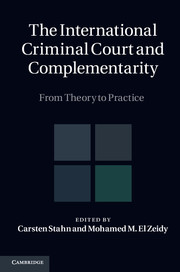Book contents
- Frontmatter
- Contents
- Acknowledgments
- Foreword by HE Judge Sang-Hyun Song
- Foreword by Patricia O’Brien
- Foreword by Silvia A. Fernandez de Gurmendi
- List of abbreviations
- Introduction: bridge over troubled waters?
- PART I General reflections
- PART II Origin and genesis of complementarity
- PART III Analytical dimensions of complementarity
- PART IV Interpretation and application
- PART IV (Continued) Interpretation and application
- PART V Complementarity in perspective
- PART VI Complementarity in practice
- 31 Making complementarity work: maximizing the limited role of the Prosecutor
- 32 Positive complementarity in action
- 33 Complementarity and the construction of national ability
- 34 The Colombian peace process (Law 975 of 2005) and the ICC’s principle of complementarity
- 35 Darfur: complementarity as the drafters intended?
- 36 Complementarity in Uganda: domestic diversity or international imposition?
- 37 Courts, conflict and complementarity in Uganda
- 38 Chasing cases: the ICC and the politics of state referral in the Democratic Republic of the Congo and Uganda
- 39 A problem, not a solution: complementarity in the Central African Republic and Democratic Republic of the Congo
- 40 Complementarity and the impact of the Rome Statute and the International Criminal Court in Kenya
- Index
- References
35 - Darfur: complementarity as the drafters intended?
from PART VI - Complementarity in practice
Published online by Cambridge University Press: 05 November 2014
- Frontmatter
- Contents
- Acknowledgments
- Foreword by HE Judge Sang-Hyun Song
- Foreword by Patricia O’Brien
- Foreword by Silvia A. Fernandez de Gurmendi
- List of abbreviations
- Introduction: bridge over troubled waters?
- PART I General reflections
- PART II Origin and genesis of complementarity
- PART III Analytical dimensions of complementarity
- PART IV Interpretation and application
- PART IV (Continued) Interpretation and application
- PART V Complementarity in perspective
- PART VI Complementarity in practice
- 31 Making complementarity work: maximizing the limited role of the Prosecutor
- 32 Positive complementarity in action
- 33 Complementarity and the construction of national ability
- 34 The Colombian peace process (Law 975 of 2005) and the ICC’s principle of complementarity
- 35 Darfur: complementarity as the drafters intended?
- 36 Complementarity in Uganda: domestic diversity or international imposition?
- 37 Courts, conflict and complementarity in Uganda
- 38 Chasing cases: the ICC and the politics of state referral in the Democratic Republic of the Congo and Uganda
- 39 A problem, not a solution: complementarity in the Central African Republic and Democratic Republic of the Congo
- 40 Complementarity and the impact of the Rome Statute and the International Criminal Court in Kenya
- Index
- References
Summary
When the International Criminal Court (‘ICC’) was set up, the understanding about complementarity was that the Court was to exist in a slightly antagonistic relationship with domestic jurisdictions. The idea was that the ICC would prod states them with the not so implicit threat that, if they did not prosecute international crimes, the ICC would step in and do so. However, even early on some scholars noted the ‘complementarity paradox’, that the ICC would have to rely on the assistance of authorities that it had declared to be unwilling or unable to prosecute those crimes. As a result, the Prosecutor has attempted to move towards a more constructive relationship between the ICC and national jurisdictions, assisting them, and largely shying away from prosecuting governmental officials on the basis of a policy of ‘positive complementarity’, but with one exception.
This is Sudan. Following the referral of the situation in Darfur to the Court by the Security Council in Resolution 1593, the Prosecutor began in a diplomatic idiom, relying on the fact of inactivity rather than unwillingness or inability, but then had to move to declaiming the lamentable failure of Sudan either to prosecute government officials suspected of crimes or to permit the ICC to take custody of them. This has reached its apogee in the indictment of the President of Sudan, Omar al Bashir, for war crimes, crimes against humanity and genocide. This chapter will investigate the way in which the attitude of the Prosecutor towards Sudan reflects the original concept of complementarity, and thus seek to reflect on the difficulties that have accompanied the concept, perhaps from the start. It will also look at the extent to which the Security Council could have, or should have, made any difference.
- Type
- Chapter
- Information
- The International Criminal Court and ComplementarityFrom Theory to Practice, pp. 1097 - 1119Publisher: Cambridge University PressPrint publication year: 2011
References
- 2
- Cited by



